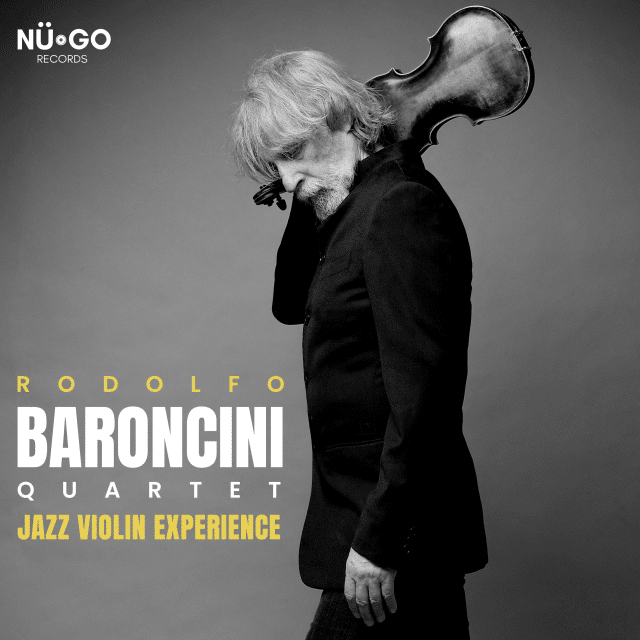Jazz Violin Experience is not just any album: to understand the importance of this record one must think of the use of the violin in classical orchestras and jazz bands from the early twentieth century to the present. In fact, the violin has helped bring classical music and jazz closer together, a cultural leap that for several decades has vitalized Italian conservatories, which for too long avoided opening “cultured music” to modern space-time, excluding the twelve-tone avant-garde or Luciano Berio’s electronic avant-garde.
Yet classical music used jazz scales and harmonies as early as Igor Stravinsky (Histoire du soldat, or Ragtime for 11 instruments in 1918) until the Ebony Concerto for clarinet and jazz band in 1945. Stravinsky admired jazz musicians such as Miles Davis, Charlie Parker, Charlie Christian, Duke Ellington, and was reciprocated by them. In Italy, the man-barrier between classical and jazz was Giorgio Gaslini, who sowed the seeds of Afro-American music in Rome in the 1970s, creating geniuses of short flight such as saxophonist Massimo Urbani and the Folk Magic band in which Rodolfo “Rudi” Baroncini, among others, participated.
The use of the violin in jazz has emerged along two main lines: on the one hand, the warm tones of manouche jazz of Stéphane Grappelli and his alter ego Django Reinhardt; on the other hand, the electrified sound of Jean-Luc Ponty, which achieved excellent results especially in Frank Zappa’s compositions (listen again to “Dupree’s Paradise,” live in Stockholm, 1973). Staying in Zappa’s environs, let us not forget the R&B of Don “Sugarcane” Harris’ violin in Directly from my heart to you (1970). Recall that in his later years Zappa devoted himself to orchestrating works by Edgar Varèse and Anton Webern.
Jazz Violin Experience perfectly embodies the bridge between classical, jazz and other musical “contaminations.” Baroncini-with Bruno Tommaso and others-participated in the meetings that led to the founding of the Scuola Popolare di Musica di Testaccio in Rome, and taught “History of Music” and “History and Aesthetics of Jazz” at the Adria Conservatory, also dealing with the history of the Baroque repertoire for the violin.The Quartet that recorded the album (Nü GO Records label, 2024) consists of Rodolfo Baroncini on violin, Tobias Nicoletti (piano), Giuliano Stacchetti (electric bass) and Andrea Bongiovanni (drums).
The group debuted at the Alexanderplatz Jazz Club on Feb. 27, 2024, and performed at the most important jazz clubs in Rome. The CD was released after a few months on the wave of rapid success.
The sonic signature of the album is a new sound for the jazz violin. The pieces are largely original and are based on experimentation with sound that starts with the violin, a monophonic instrument, with harmonic and rhythmic constructions between the piano and other instruments, to which solos of the different instruments are added. Mawimbi and Storie di Sempre are Baroncini’s arrangements of compositions by Lorenzo Miatto; Iris and Aogri are by Tobias Nicoletti, Aurora’s version is by Giuliano Stacchetti, while My Favorite things is a collective arrangement of the song made famous by Coltrane, which adds an introduction in 5/4 that enhances the theme in 3 successive.
Baroncini proposes crystal-clear notes that avoid the distortion of the Jean-Luc Ponty-esque electric violin, but also reduce classical vibrato as much as possible. The model is the “clean” sound of Miles Davis’ trumpet, a search for a sonic holy grail that is the magnificent obsession of every music maker. Tobias Nicoletti’s piano starts with a modern reinterpretation of Bill Evans and Erik Satie. The impressionism of Paul Desmond (a giant to be reprinted and reevaluated) and Ryuchi Sakamoto emerges in Stories of Forever. Rodolfo Baroncini has also studied the techniques of Iranian music, and this is a further enrichment for a perfect first disc.
P.S. Bringing young Italian jazz composers and musicians such as the Rodolfo Baroncini quartet to the United States is a goal we will propose to the Italian Cultural Institute in New York, certain to gain the support of important Italian companies.
The article Rodolfo Baroncini quartet and his record Jazz Violin Experience comes from TheNewyorker.

